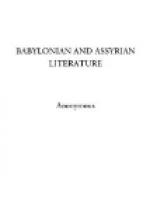186 The cities of Bustu, Sala-khamanu (and) Cini-khamanu,
fortified towns, together with 23 cities
187 which depended upon them I captured. Their fighting-men
I slew. Their spoil I carried off. To the country of
Zimri I went down.
188 Exceeding fear of Assur (and) Merodach overwhelmed
them. Their cities they abandoned. To
189 inaccessible mountains they ascended. Two hundred and
fifty of their cities I threw down, dug up (and) burned
with fire.
190 Into the lowground of Sime’si at the head of the country
of Khalman I went down.
[Footnote 1: The mountainous country near the sources of the Tigris.]
[Footnote 2: That is in the person of his commander-in-chief, Dayan-Assur.]
[Footnote 3: The modern Van.]
[Footnote 4: Parthia.]
[Footnote 5: This refers to his assuming the eponymy a second time after completing a reign of thirty years. At this period the Assyrian kings assumed the eponymy on first ascending the throne, and the fact that Shalmaneser took the same office again in his thirty-first year shows that a cycle of thirty years was in existence.]
[Footnote 6: The Gozan of the Old Testament.]
[Footnote 7: Haran or Harran in the Old Testament; called Carrhae by the classical geographers.]
[Footnote 8: Andia was afterward incorporated into Assyria by Sargon.]
THE EPIGRAPHS ACCOMPANYING THE SCULPTURES
I The tribute of ’Su’a of
the country of the Guzanians:
silver, gold, lead,
articles of bronze, sceptres for the King’s
hand, horses (and) camels
with double backs: I received.
II The tribute of Yahua[1] son of Khumri[2]:
silver, gold,
bowls of gold, vessels
of gold, goblets of gold, pitchers
of gold, lead, sceptres
for the King’s hand, (and) staves:
I received.
III The tribute of the country of Muzri[3]:
camels with double
backs, an ox of the
river ’Saceya,[4] horses, wild asses,
elephants, (and)
apes: I received.
IV The tribute of Merodach-pal-itstsar of the
country of the
’Sukhians[5]:
silver, gold, pitchers of gold, tusks of the
wild bull, staves, antimony,
garments of many colors,
(and) linen: I
received.
V The tribute of Garparunda of the country
of the Patinians:
silver, gold, lead,
bronze, gums, articles of bronze, tusks
of wild bulls, (and)
ebony[6]: I received.
[Footnote 1: Jehu.]
[Footnote 2: Omri.]
[Footnote 3: This is the Armenian Muzri, not Egypt.]
[Footnote 4: This would seem from the sculpture to mean a rhinoceros. Lenormant, however, identifies it with the Yak.]
[Footnote 5: Nomadic tribes in the southwest of Babylonia.]




